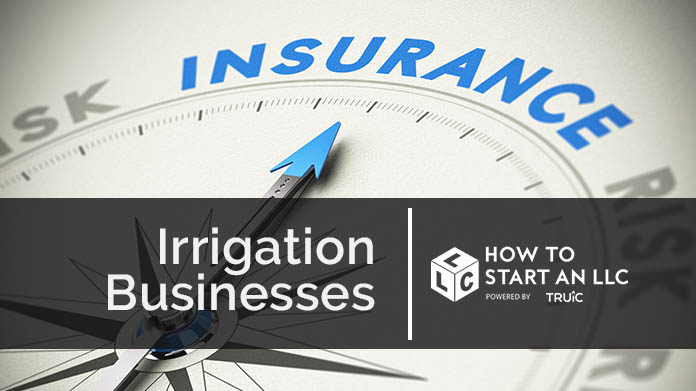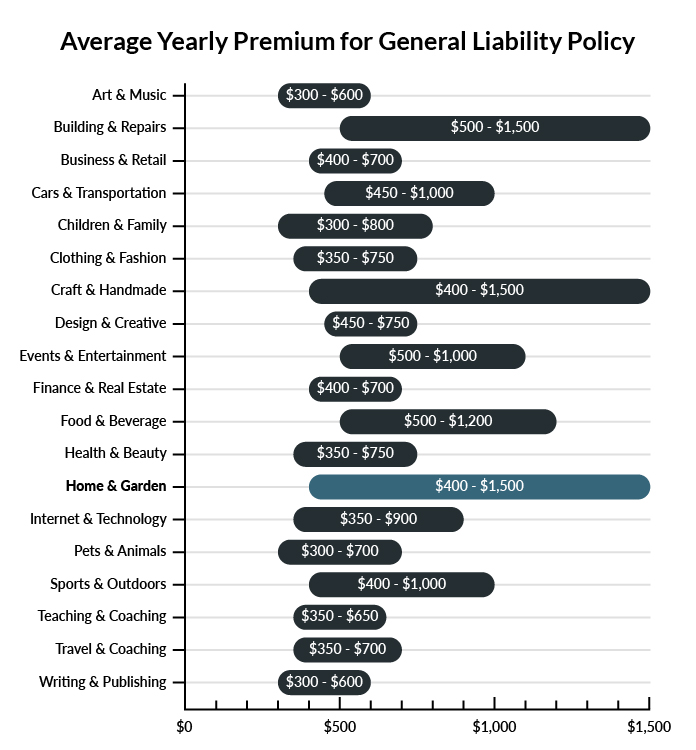Irrigation Business Insurance
Getting insurance for your irrigation company is essential.
Irrigation companies need to be protected against things like claims of breach of contract, personal injury, and property damage.
For example, you could damage someone’s property as you set up irrigation equipment, or someone could trip over a power cord that you left on the ground.
We’ll help you find the most personalized and affordable coverage for your unique business.

Recommended: Ergo Next Insurance is dedicated to matching small businesses with the right policy at the best price.
Best Insurance for an Irrigation Business
General liability insurance is — generally speaking — one of the most important insurance policies for irrigation companies.
Some of the risks general liability insurance covers are:
- Bodily injury
- Property damage
- Medical payments
- Legal defense and judgment
- Personal and advertising injury
General liability insurance is an excellent start to your business insurance portfolio. However, you may need other types of policies for full protection, such as:
- Commercial property insurance — this covers all of your irrigation company’s equipment and inventory as well as the physical building
- Business interruption insurance — this covers your irrigation company’s losses if you need to cease operating due to something like property damage
- Professional liability insurance – If someone sues you for allegedly providing negligent professional advice or services, this will cover your legal fees and any damages.
- Workers’ compensation insurance — this is often required coverage for companies with employees
To make your choice of insurer an easier one, consider that most business insurance providers fall into one of two camps:
- Traditional brick-and-mortar insurers
- Online insurers
While traditional insurers (e.g., The Hartford and Nationwide) are trusted by millions and have a lot of experience, we believe online insurers (e.g., Tivly and Ergo Next) are a better choice for most small businesses. This is primarily because online insurers are cheaper, faster, and more flexible.
Let’s Find the Coverage You Need
The best insurers design exactly the coverage you need at the most affordable price.
Cost of General Liability Insurance
On average, irrigation businesses in America spend between $400 – $1500 per year for $1 million in general liability coverage.
Compare the average cost of general liability insurance for an irrigation business to other professional industries using the graph below.
Several factors will determine the price of your policy. These include your:
- Location
- Deductible
- Number of employees
- Per-occurrence limit
- General aggregate limit
You may be able to acquire general liability insurance at a discounted rate by purchasing it as part of a business owner’s policy (BOP) rather than as a standalone policy.
A BOP is a more comprehensive solution that includes multiple forms of coverage, such as business interruption and property insurance.

Find the Best Rate
Discover the best coverage at the lowest rate in our affordable business insurance review.
Common Situations That General Liability Insurance May Cover for an Irrigation Business
Example 1: While your crew digs a trench, the client steps in the hole and breaks an ankle. General liability insurance would cover the cost of his medical treatment.
Example 2: The work you completed at a client’s business creates drainage issues, causing property damage to his building as well as to his neighbor’s building. Both sue you for the cost of repairs and lost revenue while they resolved the drainage issues. General liability insurance would pay for your legal fees and any court-awarded damages.
Example 3: Your new marketing campaign implies the other irrigation businesses in town don’t provide quality work. Several of your competitors file lawsuits against you, claiming their business suffered as a result. General liability insurance would cover your legal defense costs and any court-awarded damages.
Other Types of Coverage Irrigation Businesses Need
While general liability is the most important type of insurance to have, there are several other forms of coverage you should be aware of. Below are some of the most common types of coverage:
Commercial Property Insurance
You made a major investment in the equipment and tools required to operate your business. In the event of a fire, theft, or natural disaster, commercial property insurance would cover the cost of repairing or replacing your business-related property. This includes structural damage to your building and the business materials stored there.
You can typically purchase commercial property insurance as part of a business owners policy (BOP).
Commercial Auto Insurance
Any vehicle you use primarily for business requires commercial auto insurance to protect the vehicle, driver, and others on the road in the event of an accident. Be sure to select a policy that covers not only accident-related vehicle repair costs and medical treatment for anyone injured, but also sufficient protection for any business property you carry in your vehicle. Also consider a policy with limits that exceed the state-mandate minimum coverage.
You can purchase commercial auto insurance as part of a business owners policy (BOP) or as a standalone policy, depending upon the insurer.
Workers’ Compensation Insurance
Most states require businesses to carry workers’ compensation insurance for their part-time and full-time employees. This coverage protects your employees if they become injured at work or fall ill after a work-related accident. It not only covers an employee’s medical bills and lost wages if they need time to recover, but also any disability or death benefits stemming from a workplace accident. For extensive injuries resulting in lawsuits, this type of policy also covers your legal defense costs.
Most insurers offer workers’ compensation insurance as a standalone policy.
Inland Marine Insurance
While commercial property insurance protects your specialized tools and equipment when you use or store them on company-owned property, it doesn’t cover them in transit or in use at a client’s property. Inland marine insurance fills that gap, providing off-premises coverage for your business property, equipment, and tools.
Commercial Umbrella Insurance
While your general liability insurance policy covers most claims, some accidents or lawsuits may be so catastrophic that they threaten to exhaust the limits of your primary coverage. Commercial umbrella insurance protects you from paying out-of-pocket for any legal fees and awarded damages that exceed your primary policy.
Additional Steps To Protect Your Business
Although it’s easy (and essential) to invest in business insurance, it shouldn’t be your only defense.
Here are several things you can do to better protect your irrigation business:
- Use legally robust contracts and other business documents. (We offer free templates for some of the most common legal forms.)
- Set up an LLC or corporation to protect your personal assets. (Visit our step-by-step guides to learn how to form an LLC or corporation in your state.)
- Stay up to date with business licensing.
- Maintain your corporate veil.
Irrigation Business Insurance FAQ
Yes, absolutely. You will need to first get a quote from an online business insurance provider like Ergo Next Insurance. Ergo Next allows you to then purchase a policy immediately and your coverage will be active within 48 hours.
A typical business owner’s policy includes general liability, business interruption, and commercial property insurance. However, BOPs are often customizable, so your agent may recommend adding professional liability, commercial auto, or other types of coverage to your package depending on your company’s needs.
“Business insurance” is a generic term used to describe many different types of coverage a business may need. General liability insurance, on the other hand, is a specific type of coverage that business owners need to protect their assets.
Yes. Before taking on customers for your irrigation company, you need to protect it financially with adequate business insurance. If you don’t, you will expose your company to unnecessary financial risk.
For an irrigation company, we recommend getting general liability, property, and professional liability insurance.
Not necessarily. Certain exceptions may be written directly into your irrigation business insurance policy, and some perils may be entirely uninsurable.
Yes, an LLC is meant to create a legal barrier between your business and your personal assets and credit. If you haven’t formed an LLC yet, use our Form an LLC guide to get started.
An LLC doesn’t protect your business assets from lawsuits and liability– that’s where business insurance comes in. Business insurance helps protect your business from liability and risk.